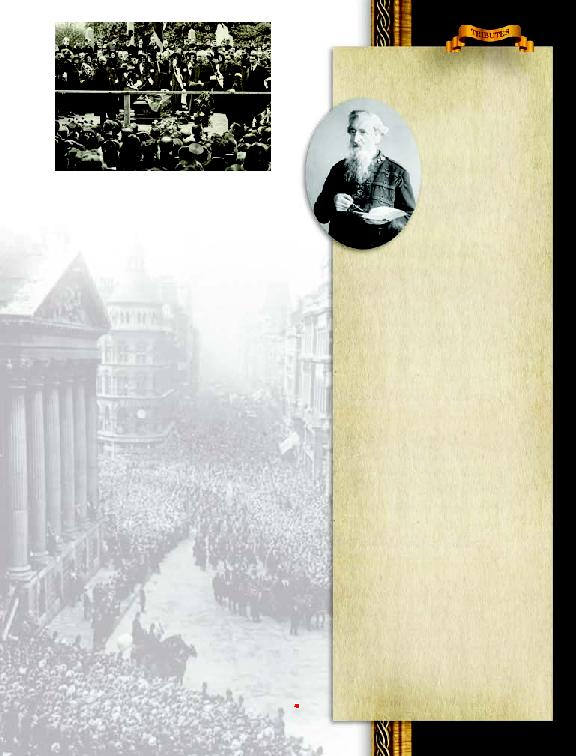
borne to Olympia, a vast exhibition hall on
Hammersmith Road, West London, 40,000 peo-
ple flocked to his funeral service�and to many
and purpose. Officers on furlough from all over the world--
among them Eva--arrived post�haste from New York and
knelt beside the casket to rededicate themselves to God
and the Army. Along with them knelt thieves, tramps,
harlots, the lost and outcast to whom Booth had given
his heart.
staunch admirer of Booth's, along with her Lord Chamber-
lain, Lord Shaftesbury. At the last moment, as Lord Shaftes-
bury later told the Army's Colonel Isaac Unsworth of head-
quarters staff, the Queen had elected to come without
warning and there was no other seat to be had. Beside her
on the aisle seat was a shabby but neatly dressed woman.
Shyly she confided in the Queen: once she had been a pros-
titute and only the Salvationists saved her from death.
Years later, at a meeting, General Booth had heard her
story and told her gently: "My girl, when you get to Heaven,
you'll have a place of honor, because Mary Magdalene will
give you one of the best places."
ers--the three faded carnations that were the only flowers
that lay on Booth's casket. She had come early to claim an
aisle seat, guessing the casket would pass within feet of
her--and as it did she unobstrusively placed the flowers on
the glass lid.
............................
same sequence of prayer and
rang as cheerfully as ever. Only, somehow, there was
a touch of solemnity and of a deeper emotion added
to the open-air services, which sent a hush all along
the streets, and seemed to attract people almost in
spite of themselves.
about, evidently "out for a lark," might try to brazen
out the preachers and musicians, but one by one they
were silenced, and drawn as if by some irresistible
force towards the circle on the center of the road, over
which the Salvation Army flag floated. It would be
difficult to say whether, having come to scoff, they re-
mained to pray, but they certainly stood by with their
rough red hands folded, and their faces very quiet.
tention to the Army, paused a moment as they passed,
and not a few men lifted their hats, in token of respect
for the dead leader. Lads in their teens, as a rule ab-
solutely superior to any emotional influences, stood
rather shamefacedly watching the men who stood
bare-headed, praying to the "God of the Army, the
Father of the Poor, the help of the helpless" that He
might guide them still, and make them more zealous
to save souls, now that their leader was no longer
with them in the flesh.
the Salvationists thickened, and many an offering,
given by those who can but offer little, was quietly
put into the collecting box which the Hallelujah Lass,
as usual, carried round. There was no extra commotion,
no special appeal to attention, in the Sunday street
services, but when the little band marched on, to the
tune of that hymn which at least the present generation
will never hear without a special thrill, "Nearer my
God to Thee," the noisy street became as silent as a
cathedral, and there was not a face but had upon it
the look that only comes when the heart and the
spirit are stirred to the depths.